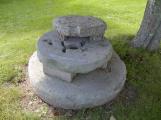5
This Grindstone was used by the first Acadian settlers of the area to grind wheat into flour.15 September 1700
Hopewell Hill, New Brunswick, Canada

6
He returned to Chipody in the spring of 1700 with his wife and nephew along with poultry, pigs, cows, a horse, and the two mills. Work continued that spring growing more crops, digging ditches, making aboiteaux and building a dam on which to put the mill.In all of this work, Thibodeau was thought of as the leader and instructed the people where to build and what work to do. Many of the young men who came from Port Royal to help with the work, also picked out the land that they wanted to build their homes on when they were married.
In the fall of 1700, buildings were up and occupied, 44,800 feet of aboiteaux and ditches had been built along the marsh, and the mill was operating. Because of their close proximity, the Thibodeau and Blanchard settlements often got together for parties or feasts and shared any news that they received from Port Royal.
By the next spring, many things had started to come together in the settlement. The settlers had flour and lumber from the mills, milk and butter from the cows, one crop of oats harvested, and they had collected sap for making maple sugar. However, despite these successes they still had to hunt and fish to provide enough food to eat. They also made their own Acadian drink called Spruce beer, from the fermentation of spruce boughs. There were a total of 18 people at the Chipody settlement including some of the young men who by now had married and had begun building their houses on the lots they had chosen. Among them were Jacques Martin and his wife who lived in a house along with her parents. His wife was pregnant and would give birth to the first baby in Albert County of European ancestry. Her father, Jean Brossard, and his wife were so captivated by the land, that they too began to clear land at Chipody. Two of Jean Brossard's sons married daughters of Pierre Thibodeau and lived in the Shepody settlement. One of Jean Brossard's sons, Joseph Brossard, who would later call himself Beausoleil, became a hero to the Acadians during the Acadian Expulsion.
When Thibodeau returned in the spring of 1702, he was treated as the guest of honour by the settlement. Muskets were fired in celebration and he was given porcelain collars by the Indians. The settlement he returned to was full of activity. At this time five farms had been built. Sugar camps and the mill were running. Wheat was planted, cattle were being raised and there was always ongoing labour. As Thibodeau was getting quite old, he had to decide what he would do with this land. He decided not to divide up the land, but to give it to his oldest son, Pierre, who he felt was best prepared to take over the responsibility. He also arranged a marriage between his youngest son Charles, and the daughter of Broissard, the wealthiest and most well known of the tenants of the Seigneury.
New settlers were eager to follow Thibodeau to the new settlement as they had a great respect for him. He was "a man well-known and well reputed; he was esteemed for his ability and his wealth." By the spring of 1702, the two Acadian settlements had grown to a total population of 48 inhabitants, 33 of which lived in the Chipody settlement. During the summer the two groups would get together, often on Sundays, when the young wives would gather around the dykes, or for an evening at someone's home.
That summer a party was given when the hay was harvested. Thibodeau, age 72, along with his wife and their future daughter-in-law, rode on top of the last hay wagon pulled by four oxen as the settlers followed behind, shouting and laughing. The celebration included a picnic feast on the lawn of one of the families.
Thibodeau left Chipody a few days later. He returned to Port Royal in August to news that war had broken out. Thibodeau had suspected that war would break out and had already stocked up on supplies for the settlement. He had built a storage building, to store the extra supplies, in the middle of the woods to prevent the English from finding them.
In March of 1703, news came that the Council of State had granted title to the lands of Chipody and Peticoudiak to the settlers, but judgement on the question of seigneurial rights was reserved. Nothing is known about what happened to these Acadian settlers after 1704, until the Expulsion of the Acadians in 1755.